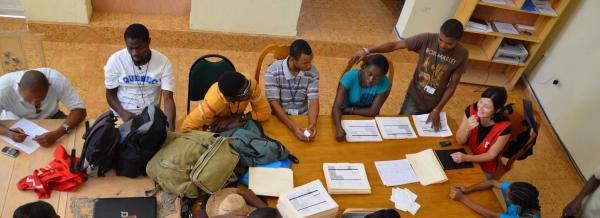It's not like an Indiana Jones movie—you won't get chased by giant boulders or have to rescue fair maidens from the perils of ancient tombs. But volunteering on an archaeological excavation can be a rewarding way to experience a new culture.
As a history-obsessed 16-year-old, Tara Cajacob volunteered at Chapel House Wood in the Yorkshire Dales of England. She found the opportunity through the non-profit organization Earthwatch. The site was located on steep pastureland where, beneath the overgrown grass, ridges of stone told the stories of the prehistoric people who once lived there.
Ten years later, Cajacob is now a family history researcher. She says the experience of uncovering the remains of prehistoric dwellings more than made up for the sunburn, the sore muscles and the cold—all staples of the field experience. Her work on-site consisted mainly of surveying the area, locating landscape features made or modified by humans, taking measurements and creating diagrams. All this had to be completed before she could touch trowel to earth for the first time.
"But when my trowel finally broke the ground and my hands were submerged in the cold mud—that was the highlight of my trip," she recalls.
Volunteers wanted
Archaeological excavations are either run by a university archaeology department or by a contract archaeological firm (whose job usually consists of recording data on a site before it is destroyed to make way for a highway or high-rise). The work is slow and painstaking, and many excavations—especially those run by universities—recruit volunteers to help cope with the workload.
Sarah Yeomans, the director of Educational Programs at the Biblical Archaeology Society in Washington, says that most dig directors are delighted to have volunteers on board, no matter their age, profession or skill level. "Two years ago, we had an 82-year old Irish priest. That same year, a woman brought her eight-year-old son, who we put to work moving small rocks. That kid had a blast," says Yeomans.
Coffee and cold beer
Hiring equipment and housing a team for a season is very expensive, so the director will maximize dig time and money by having the team live on-site. This usually means camping or being billeted with a local family. A typical day begins at sunrise with plenty of coffee and extends through 12 hours of painstaking work, before finishing at around sunset with a warm meal and a cold beer (or three).
"I still remember the awe I felt when looking at those aeons-old bones,” says Haeder. “Even now I get a chill up my spine thinking about it."
Although many modem machines, such as ground-penetrating radar, can assist with locating archaeological features and artefacts, the majority of work is still done by hand, scraping away dirt or sand with trowels and spades to reveal a picture of the past. A site will be divided into squares and each square is marked off with string. In your square you will carefully scrape away each layer of dirt and record the artefacts and features that you uncover.
It may sound like drudgery, but when your trowel hits something significant, all thoughts of backache and sunburn disappear. Valerie Haeder volunteered on a paleontological excavation in the Thunder Basin National Grassland, Wyoming, and was lucky to discover the remains of a hadrosaur.
"I still remember the awe I felt when looking at those aeons-old bones. It was thrilling to know that I was the first living being in 65 million years to see the remains of this dinosaur,” says Haeder. “Even now I get a chill up my spine thinking about it."
There are hundreds of volunteer opportunities available. Look for excavations that have a history of working with volunteers and see if you can talk to past volunteers about their experiences. If you have a particular field of interest, such as Egyptian or Biblical archaeology, this could be a great way to narrow down your search. Also, some excavations might be looking for volunteers with specific skills—for example, experienced divers to participate in underwater surveys.
Cajacob’s advice to would-be volunteer diggers is to expect hard work. “If going on an archaeological excavation is a dream of yours, put in the time and effort to do it well,” she says. “Ask questions; learn as much as you can. The experience that I got when I was 16 has impacted my life to this day and helped shape my understanding of history—and 10 years later, my career in history."
Volunteer on a dig
Check out these sites:
Adventures in Preservation
Hands-on preservation opportunities.
Archaeological Fieldwork Opportunities Bulletin
Searchable database maintained by the Archaeological Institute of America.
Earthwatch
This organization pairs volunteers with archaeological and environmental projects all over the world.
Find-A-Dig
Search volunteer opportunities posted by the Biblical Archaeology Society.
Past Horizons
An excellent and up-to-date searchable dig database, with tips and news for amateur archaeologists.
This article originally appeared in the Fall 2014 issue of Verge.
Add this article to your reading list



